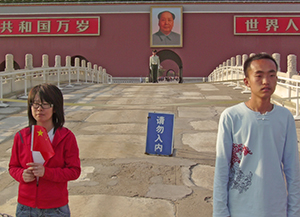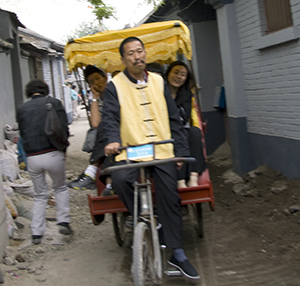Now that China has made its official debut as a superpower on the Olympic world stage and the fabled fire breathing dragon is fully awake, a personal reflection on a recent trip there this May is certainly overdue. Unfortunately, the visit eerily coincided with the Sichuan Earthquake which added an unexpected dimension to the experience. Besides bonding with the Chinese people for the official moment of silence as this great nation came to a complete halt, I could not help but compare its handling of a major natural disaster against that of Hurricane Katrina in New Orleans. While viewing coverage on their English language TV channel, it seemed that a vigorous response from the government and a solidarity of the people were almost immediate. Traveling can at times be unsettling, but it certainly provides a different perspective and deeper understanding of the country you’re visiting and indirectly, your own country.
One can travel independently and not rely on the prepackaged tours that are available on the internet. The advantages are keeping your own travel pace, choosing your own travel mates and selecting your own travel itinerary. Such freedom would probably not include all those famous factory tours for pearls, jade, lacquered furniture and silk, so criticized by unsuspecting tourists on the travel forums. However, even if doing it yourself, these shopping stops cannot be totally avoided because day trips booked through your hotel mysteriously add them on when least expected.
Prepackaged tours are still a good choice if economy and the least amount of hassle and confusion are needed for your vacation enjoyment. Certainly a person could do the major cities like Beijing and Shanghai by themselves, but venturing beyond them requires some language skills, extra time and patience to negotiate logistics. Several believe this extra effort is the essence of traveling while for others, it’s an unnecessary burden on their yearly two-week vacation. When considering China as a travel destination, keep in mind that there’s also a new influx of indigenous Chinese tourists who can add to the crowds at such hot spots as the Xian’s Terracotta Warriors and Forbidden Palace.
A surprising benefit of the prepackaged, one-size-fits-all tours are the local guides who live in the area for the sites you’re visiting, and are utilized by certain travel operators. These local guides offer the usual historical banter at the appropriate times, but during those long hauls on the bus through congested city streets or rural highways, their lectures veer towards a dialogue where questions are asked about modern Chinese life and then are answered with references to their own personal lives.
One local guide was a middle-aged woman, a member of the new rising middle class, married to a doctor, (although teachers seem to be more honored in China), who spoke about raising an only daughter poised to enter college. Of course, she’s a bright, talented child who wants to embark on a fashion design career. However, in order to accomplish her goal, the daughter wants to attend a foreign college and she likes the ones in England. The mother is doing everything possible to grant her daughter’s wish, a phenomenon not foreign to Western culture, but for this generation in China, much more intense.

 The Little Emperors in Tiananmen Square
The Little Emperors in Tiananmen Square
This generation born of the one-child-family policy instituted by the government in the late 1970’s is special and has generated the moniker "Little Emperors". They are considered a bit spoiled and sometimes do not function well socially. The lavish attention bestowed on them by four grandparents and two parents is what’s known as a 4-2-1 paradigm, since this only child has to shoulder the legacy of two families and will inherit the wealth as well as anxieties of both. How this generation will affect China’s future is anyone’s guess and to a certain extent everyone’s worry.
They seem to favor the techno superficiality and narcissism exhibited by youth in the West; an outsider can feel a sense of relief over that fact, or one of dread depending on your perspective. As a young tour guide answered when asked if she had a steady boyfriend, she giggled, "no", but then half seriously added that a potential boyfriend must have the four "c’s" – he must have a car, condo, cash and of course, be cute. As she spoke in English, one was left to wonder what the Mandarin translation would be to such a bold declaration, or was this just a snide joke for the benefit of the tour group. Since she was talking about herself, everyone was in on the joke and laughed, but there are always subtleties to humor that sometimes get lost in translation.
Some believe that China is actually two countries, one urban and the second, rural. The differences between the two are almost like the famous yin/yang symbol, the Tao. Keeping a balance between them is a prodigious task as one hurtles forward into the 21st century, and the other is bogged down in various periods of the past. Certainly the media spotlight is being focused on China’s future, its sprawling urban centers. Here, building cranes occupy the skyline, their long beaks alongside unfinished highrise condos transforming major cities like Beijing and Shanghai from the horizontal to the vertical.

 Pedicab jam in the hutong
Pedicab jam in the hutong
A few old neighborhoods still exist with their narrow alleys and old customs. They are called hutongs and that’s where you can still find multigenerational family dwellings crowded around small courtyards, who knows for how long, though. In the meantime, most tours will include a thrilling pedicab ride through the narrow alleys of a hutong and a short visit into the home of some of its inhabitants, possibly a retired couple who have the time to host nosy tourists and answer pointed questions about their lifestyle. For some it’s probably better to turn their old home into a museum than be forced to move into a new place without memories or tradition.
Although China might not be considered a very religious country, the ruling party does recognize its importance for social order and harmony, and it falls back on the traditional stalwarts – Taoism, Buddhism and Confucianism to fill that void. Some newer spiritual movements labeled "evil religions" are considered too radical and therefore banned or persecuted. The other advantages of supporting these three main religions are that many of their temples have been restored and now serve as tourist destinations, providing spiritual space for the people, income from tourists and an outward manifestation of tolerance. Since most of these ancient temples were damaged during the Cultural Revolution, there might possibly have been some unreported spiritual awakening in China in the intervening years reflecting the prodigious efforts necessary for their restoration. This aspect of China’s recent history seems to have gone by unnoticed or misunderstood. Since China has such a grand history, it could be argued that nothing more needs to be added. Yet a visitor is still left with the feeling that it’s a work in progress, and the gnawing realization that a return trip is not just a dream, but a destiny.
Mike Mannetta is the creator of the travel DVD’s, Adirondack Great Camps, Parts 1 & 2.